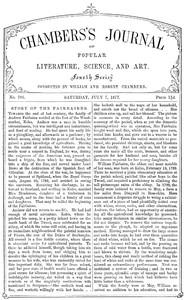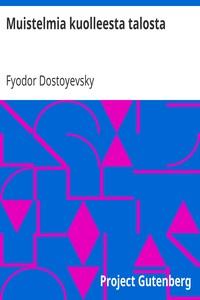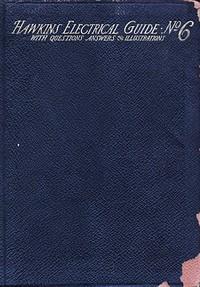Read this ebook for free! No credit card needed, absolutely nothing to pay.
Words: 14981 in 5 pages
This is an ebook sharing website. You can read the uploaded ebooks for free here. No credit cards needed, nothing to pay. If you want to own a digital copy of the ebook, or want to read offline with your favorite ebook-reader, then you can choose to buy and download the ebook.
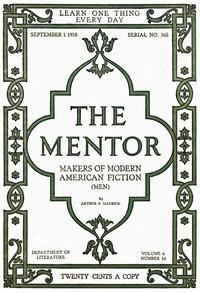

: The Mentor: Makers of American Fiction Vol. 6 Num. 14 Serial No. 162 September 1 1918 by Maurice Arthur Bartlett - London Jack 1876-1916; Davis Richard Harding 1864-1916; American fiction 20th century History and criticism; Tarkington Booth 1869-1946; Cham
Fiction Makers of Modern American Fiction Booth Tarkington Robert W. Chambers Richard Harding Davis Jack London Rex Beach Stewart Edward White Makers of Modern American Fiction Norris' Realism and McCutcheon's Romanticism John Fox and Harold McGrath A Group of Popular Story-Tellers Dreiser and Dixon Harrison and Bacheller Fiction Notes in Varied Keys Fiction of Adventure Each Holds a Place of His Own Supplementary Reading The Open Letter The Couriers of the Postal Service The Mentor in the Desert Transcriber's Notes
FICTION
There is a popular notion that anyone can write a story. A good novel is easy reading, and it seems, on that account, to be easy writing. Many a reader, in the comfortable enjoyment of good fiction, misses the genius of it altogether. He is like the skeptical young man who could see nothing difficult in the art of sculpture. "All you need to do," he said, "is to get a block of marble, then take a hammer and chisel, and knock off the parts you don't want." So stated, sculpture does seem very simple. But, after all, there is some importance in knowing what parts of the marble to knock off.
Many of us feel, at times, an inward stir that prompts us to express ourselves in the written word. We are quite sure that we could write a novel or a play. That we don't do so is simply because we are so busy--or something else. "I could write plays as well as Shakespeare if I'd a mind to," said someone years ago to Charles Lamb. "Yes," answered the gentle humorist, "anyone could write plays as well as Shakespeare--if he had the mind to."
Some take their pen in hand to prove to themselves how easy it all is. When they have tried out several of the productions that they have dashed off so readily, they sometimes discover that what was easy writing for them was hard reading for others, and the wise ones then come to realize that the good fiction that makes such easy reading is often the finished and refined product of double and re-doubled labor.
For those that are determined to win their way in fiction, the means for study and observation are ample. There are many books on the art of writing to inform and guide the aspiring author, and there is a wealth of fiction literature ever at hand to supply him with examples of good story writing. In a helpful, informing book on the technique of fiction, Professor Charles F. Horne makes clear the essential elements of the novel--which he finds to be six in number: Plot, Motive or Verisimilitude, truth to life, Character Portrayal, Emotional Quality--Sentiment, Passion, Background, Style. "A novel," Professor Horne writes, "cannot consist simply of a fixed picture, a description of a man in repose. It must show him acting and acted upon. In other words, it deals with man in his relation to his environment. Hence it must have two essentials: the man and his movements; that is, the characters and the story. The causes and effects of these two essentials give us two more. The man can only move as he is swayed internally by his emotions; and the movement can only be seen externally in its effect on his surroundings, his background. These four form the positive elements or content of the novel, and they must be presented under the limitations set by man's experience of life or verisimilitude, and by his modes of conveying ideas, his style of speech."
W. D. M.
THE MENTOR ASSOCIATION
ESTABLISHED FOR THE DEVELOPMENT OF A POPULAR INTEREST IN ART, LITERATURE, SCIENCE, HISTORY, NATURE, AND TRAVEL
THE MENTOR IS PUBLISHED TWICE A MONTH
BY THE MENTOR ASSOCIATION. INC., AT 114-116 EAST 16TH STREET, NEW YORK, N Y. SUBSCRIPTION, FOUR DOLLARS A YEAR. FOREIGN POSTAGE 76 CENTS EXTRA. CANADIAN POSTAGE 50 CENTS EXTRA. SINGLE COPIES TWENTY CENTS. PRESIDENT, THOMAS H. BECK; VICE-PRESIDENT, WALTER P. TEN EYCK; SECRETARY, W. D. MOFFAT; TREASURER, J. S. CAMPBELL; ASSISTANT TREASURER AND ASSISTANT SECRETARY, H. A. CROWE.
SEPTEMBER 1, 1918 VOLUME 6 NUMBER 14
Free books android app tbrJar TBR JAR Read Free books online gutenberg
More posts by @FreeBooks

: A brief narrative of the Fourth Tennessee Cavalry Regiment Wheeler's Corps Army of Tennessee by Guild George B - Wheeler Joseph 1836-1906; Confederate States of America. Army. Tennessee Cavalry Regiment 4th; United States History Civil War 1861-1865 Regime
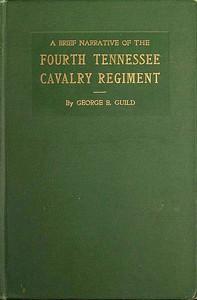

: Chambers's Journal of Popular Literature Science and Art No. 706 July 7 1877 by Various Chambers Robert Editor Chambers William Editor - Periodicals Chambers's Edinburgh Journal
